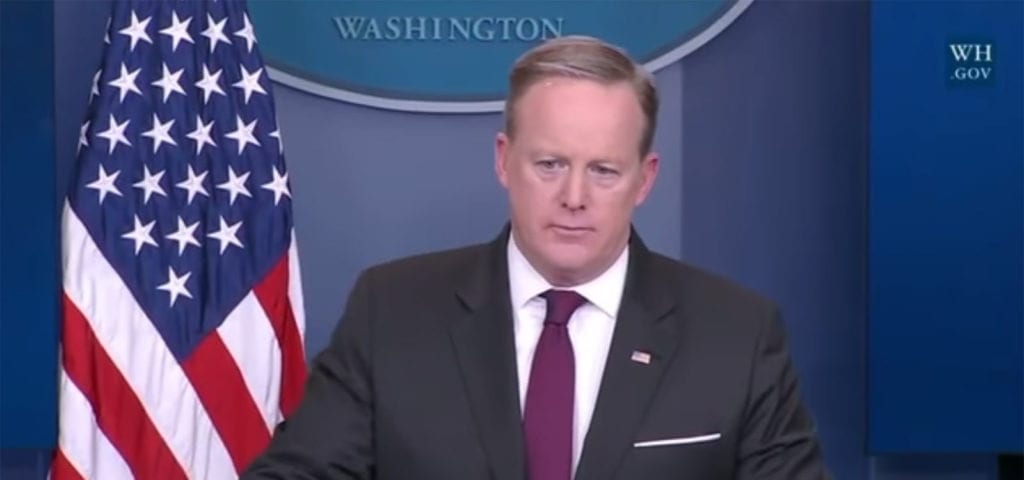Yesterday, White House Press Secretary Sean Spicer seemed to put the legal cannabis industry on notice. Following a month of ‘will they, or won’t they,’ it appears the Trump Administration may plan on breaking from its states’ rights platform, with Spicer drawing a line between the medical and recreational markets; echoing Attorney General Jeff Sessions, who made the same distinction between the two markets during his confirmation process.
Spicer, though, would take the War on Drugs rhetoric even further – linking recreational cannabis to the “opioid addiction crisis”; which drew an “unproven” rating from the fact-checking website Snopes.
“While the concept of marijuana as a ‘gateway drug’ remains controversial, there is a near-universal agreement that the opioid crisis was caused by an influx of legal prescription painkillers and is thus unrelated to marijuana use,” the researchers concluded.
In an interview with Denver7, Isaac Dietrich, CEO of MassRoots, pointed to the decline in opioid deaths in Colorado as a sign that legalizing cannabis would be a tool to stem the epidemic – “it’s not a coincidence.”
“Cannabis is a healthy alternative to pain pills and heroin, not a gateway to it,” he said in the report.
Scott Rudder, president of the New Jersey Cannabusiness Association also took aim at Spicer linking cannabis to heroin and opioid addiction.
“I’m never sure if it’s ignorance or purposeful distraction when a person in the position of authority intermingles heroin and cannabis when talking about opioid addiction,” Rudder said in an emailed statement. “Cannabis is not an opioid. Period.”
Rudder also noted the recent report showing that the cannabis industry would create more jobs than government, manufacturing, and utilities sectors.
“When you couple together the facts on what cannabis is and is not, with the amount of jobs and revenue that is generated from a well-regulated industry, it would be foolish to turn back the clock on the progress being made,” he said.
In his response to Spicer’s comments, Erik Altieri, executive director of NORML, said any actions to crack down on the legal cannabis industry would “lead to swift backlash from the 71 percent of Americas who think marijuana policy should be dictated by the states and is a foolish and reckless decision to take our country.”
“If the Trump administration goes through with a crackdown on states that have legalized marijuana they will be taking billions of dollars away from state-sanctioned businesses and putting that money back into the hands of drug cartels,” he said in a statement.
Justin Strekal, NORML political director, said both President Donald Trump’s and Sessions’ views on cannabis are “out of step with mainstream America” and “in conflict” with the cannabis laws in “over half the states in this country.”
“The fact that President Trump would allow his Attorney General to pursue a path that is so politically unpopular and contrary to the will of numerous states is absurd,” he said.
In a press release, the Congressional Cannabis Caucus, comprised of bipartisan federal lawmakers from legal states, said Spicer’s comments “reaffirmed the need” for the elected advocates in Washington, D.C.
“As co-chairs of the Congressional Cannabis Caucus, we stand ready to educate this administration on the need for more sensible marijuana policies and share the many experiences states have had with the legalization of cannabis,” the statement said. “Together, we will continue to work in a bipartisan manner to reform our failed marijuana policies and provide a voice for Americans who have overwhelmingly voted for a more sensible drug policy.”
Oregon Representative Earl Blumenauer, a member of the caucus, said he was “deeply disappointed” by Spicer’s remarks.
“The national prohibition of cannabis has been a failure, and millions of voters across the country have demanded a more sensible approach,” he said in a press release. “I’m looking forward to working with the leadership of our newly formed cannabis caucus to ensure that Oregonian’s wishes are protected and that we end the failed prohibition on marijuana.”
Annie Skinner, director of communications for the Colorado Attorney General’s Office, indicated that Spicer’s comments “were so general in nature that it’s impossible to discern what action the Administration actually will take on legalized recreational marijuana.”
“Until the Department of Justice issues an official position, we won’t be able to chart a legal course of action for Colorado,” she said in a CBS Denver report.
The Executive Director of the Cannabis Business Alliance, Mark Malone, said that targeting the industry “would be a direct affront to the overwhelming numbers of Americans who have voted time after time to approve legal cannabis.”
“The legal cannabis industry takes power and money out of the hands of drug cartels and puts funds into state coffers and has the real potential to help offset the Federal Government’s budget shortfalls,” he said in a statement. “President Trump has said that this is a state issue so we expect him to be true to his word and continue to let states regulate cannabis.”
Earlier this week, the administration rejected Obama Administration protections for transgender students that allowed them to use bathrooms corresponding with their gender identity on the grounds that it violated states’ rights – begging the question, “which is it?” Either states have the right of self-determination or they don’t – it can’t be both.
Spicer has had to walk back statements before, and perhaps he will have to, eventually, do the same here. However, with Sessions lording over law enforcement policies, along with a recent slew of executive orders enhancing policing powers – including reversing an Obama-era order phasing out the use of private prisons – it’s entirely possible that crackdowns, and subsequent lawsuits from legal states, could be on the horizon.
Get daily cannabis business news updates. Subscribe
End
